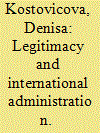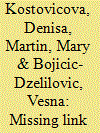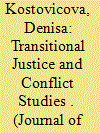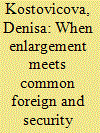|
|
|
Sort Order |
|
|
|
Items / Page
|
|
|
|
|
|
|
| Srl | Item |
| 1 |
ID:
065055


|
|
|
|
|
| Publication |
London, Routledge, 2005.
|
| Description |
xii, 322p.
|
| Standard Number |
0415348064
|
|
|
|
|
|
|
|
|
|
|
|
Copies: C:1/I:0,R:0,Q:0
Circulation
| Accession# | Call# | Current Location | Status | Policy | Location |
| 049977 | 371.8299199104971/KOS 049977 | Main | On Shelf | General | |
|
|
|
|
| 2 |
ID:
084579


|
|
|
| 3 |
ID:
084581


|
|
|
|
|
| Publication |
2008.
|
| Summary/Abstract |
Legitimacy is recognized as critical to the success of international administrations in their efforts to build and promote peace, stability and welfare in post-conflict territories. Nonetheless, scholarship on statebuilding is dominated by the 'managerial' approach, which offers a top-down analysis of policies by international actors and their impact on local constituencies. With its focus on the grass roots, the individual and a multiplicity of concerns, a human security perspective on international administration can identify and address their legitimacy gap, resulting in strategies for more effective conflict resolution. The argument is illustrated by analysis of the Ahtisaari process and plan for Kosovo's final status.
|
|
|
|
|
|
|
|
|
|
|
|
|
|
|
|
| 4 |
ID:
120002


|
|
|
|
|
| Publication |
2013.
|
| Summary/Abstract |
The concept of human security continues to defy definitional clarity at the same time as it is being embraced by policymakers. This article proposes a practice-grounded approach that focuses on investigative method as a way of linking conceptual understanding of human security to the research process. Probing the 'actorness' of individuals in volatile contexts, a study of insecurity in Kosovo shows how dialogue can be applied as a research tool to access and assess human security in the field. Dialogue permits recognition of the power of the researched in the construction of knowledge of security, and accordingly reflects the conceptual shift represented by human security from states to communities and individuals. In the Kosovo study, dialogic research captured individual agency in the face of pervasive insecurity and revealed contradictory effects of such agency. This led to the formulation of the idea of the multidirectional security marker as a means of understanding experiences of insecurity in relation to strategies to combat it. Three such markers - self-reliance, informality and community solidarity - emerged and are analysed in the case of Kosovo. Simultaneously denoting restrictions on people's security and possibilities for overcoming those very same limitations, the markers express the agential dimension of human security and show how agency and security interact.
|
|
|
|
|
|
|
|
|
|
|
|
|
|
|
|
| 5 |
ID:
141896


|
|
|
|
|
| Summary/Abstract |
Scholarly attempts to explain aid subversion in post-conflict contexts frame the challenge in terms of corrupt practices and transactions disconnected from local power struggles. Also, they assume a distinction between organised crime and the state. This comparative analysis of aid subversion in Colombia and Afghanistan reveals the limits of such an approach. Focusing on relations that anchor organised crime within local political, social and economic processes, we demonstrate that organised crime is dynamic, driven by multiple motives and endogenous to local power politics. Better understanding of governance arrangements around the organised crime–conflict nexus which enables aid subversion is therefore required.
|
|
|
|
|
|
|
|
|
|
|
|
|
|
|
|
| 6 |
ID:
165324


|
|
|
|
|
| Summary/Abstract |
This article identifies three aspects of conflict studies that are largely ignored in the transitional justice literature: debates over the causes of armed conflict, the transnational nature of contemporary violence, and the persistence of wartime actors and structures. It analyzes scholarly attempts that begin to bridge the divide between transitional justice and conflict studies. Those efforts demonstrate how engagement with conflict studies can open new research horizons in the study of transitional justice and lead to better understandings of how justice-focused interventions can bring about positive peace. However, innovation in primary data generation and methods is needed for this subfield to develop into a fully-fledged research program.
|
|
|
|
|
|
|
|
|
|
|
|
|
|
|
|
| 7 |
ID:
127677


|
|
|
|
|
| Publication |
2014.
|
| Summary/Abstract |
During the process of visa liberalisation Serbia made significant and unexpected adjustments in its Kosovo policy, which demonstrate the European Union's leverage. Serbia's compliance on Kosovo cannot be explained either by rational institutionalism, which accounts for domestic change based on cost-benefit calculations, or sociological institutionalism, which predicts domestic adaptation based on convergence of norms and identities. Applying discursive institutionalism, this empirical study of Serbia's Europeanisation identifies discursive denial as a strategy of the Serbian elite in pursuing costly policy implementation. It contributes a novel perspective on 'shallow' Europeanisation by highlighting a lack of discursive reinforcement of adopted rules.
|
|
|
|
|
|
|
|
|
|
|
|
|
|
|
|
| 8 |
ID:
192011


|
|
|
|
|
| Summary/Abstract |
Scholars have studied how women’s domestic and transnational civil society activism addresses the gendered nature of transitional justice. In contrast, they have paid scant attention to women’s impact on transitional justice policy-making in institutions. We leverage the feminist institutionalist perspective that makes visible gendered norms, rules, and discourses in institutions. Homing in on women’s influence in parliaments where women are outnumbered by men and marginalised by adversarial discourse, we develop a conceptualisation of women’s discursive agency. Foregrounding discourse in women’s ability to drive change, women’s agency is enacted through their linguistic communication style and substantive normative positions that constitute micro- and macro-level structures of domination. Quantitative and qualitative discourse analysis is applied to a corpus of parliamentary questions about transitional justice in the Croatian parliament from 2004 to 2020. Our results show that women adopt the adversarial style of questioning, which they use to broaden the scope of entitlements and press for reparations for female and male victims. They overcome constraints posed by partisanship and ideology, while constraints of nationalism are less easily broken. The article advances feminist transitional justice by demonstrating how women’s language contributes to dismantling men’s policy domination in institutions, with implications for mixed-sex interactions in non-institutional domains.
|
|
|
|
|
|
|
|
|
|
|
|
|
|
|
|
|
|
|
|
|